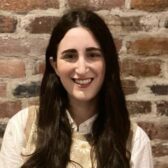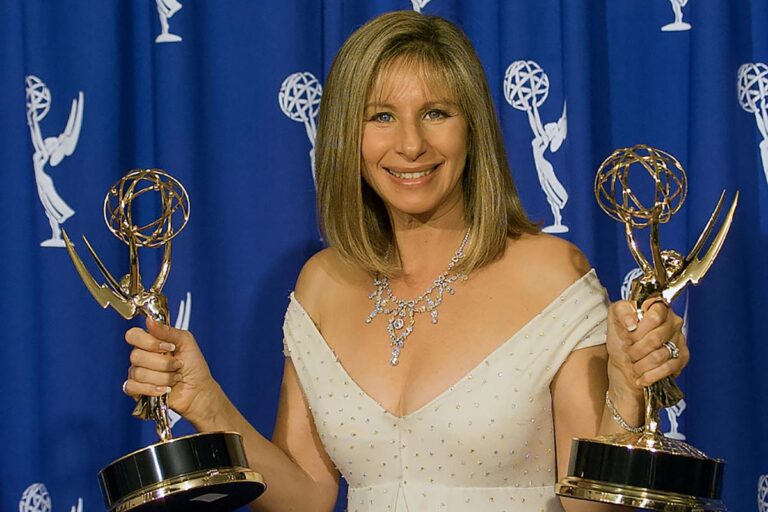
Barbra Streisand received the Lifetime Achievement Award on February 25, 2024, at the 30th Screen Actors Guild Awards ceremony.
There was not a dry eye in the house during her acceptance speech when Streisand, now 81, recounted her decades-long career, paid homage to the Jewish filmmakers who built Hollywood and wished for a world without antisemitism and hate.
The founders of Hollywood studios were all “fleeing the prejudice they faced in Eastern Europe simply because of their religion…I dream of a world where such prejudice is a thing of the past,” the legendary singer and actress said.
On the heels of Streisand receiving this honor, let’s unpack her Jewish background and history of Jewish activism.
The basics
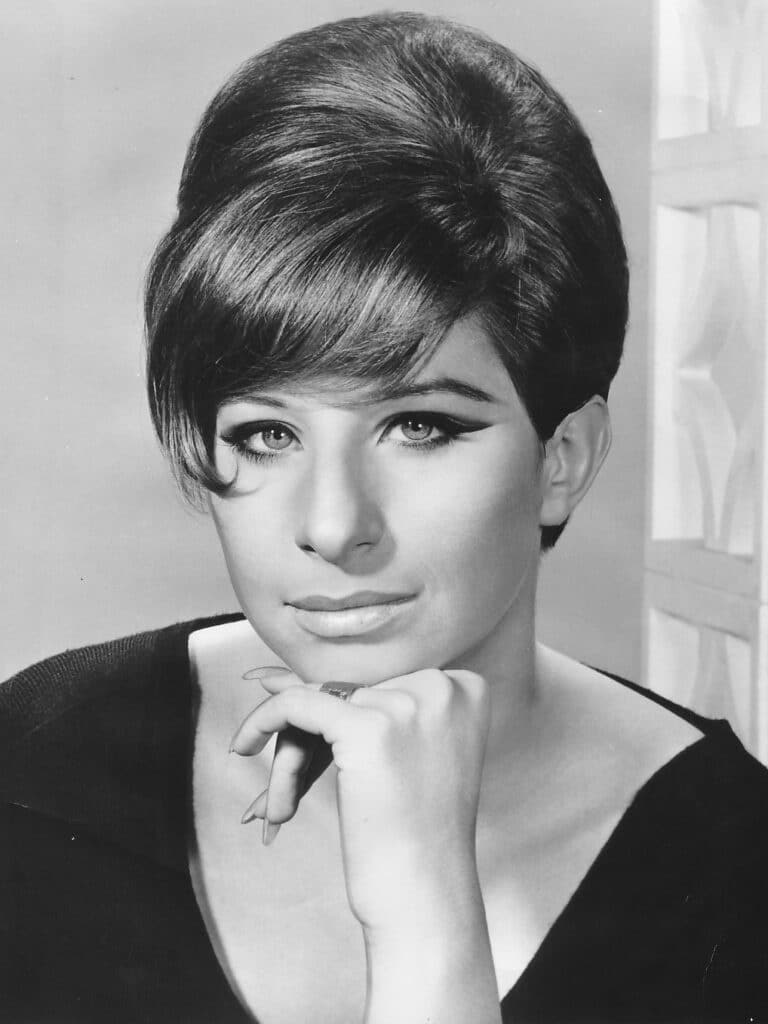
Barbra Streisand was born in Brooklyn on April 24, 1942, to Emmanuel Streisand and Diana Streisand-Kind. Tragically, Streisand’s father died of respiratory failure when she was just 15 months old.
She was raised in an Orthodox Jewish home. In 2019, she told Refinery29 that the family observed Shabbat, and the young Streisand would attend synagogue on Saturdays with her grandfather.
“I could follow the Hebrew because I went to the Yeshiva of Brooklyn, where half the day was spent on English studies and the other half on Hebrew culture,” Streisand said.
After her father’s death, Streisand and her family moved in with her grandparents, and they stayed there until her mother remarried when Streisand was 8 years old. She first fell in love with Broadway and considered her own ambitions on the stage at age 14 when she saw “The Diary of Anne Frank.”
“I was mesmerized by the play,” she wrote in her 2023 memoir “My Name is Barbra.” “Anne is 14, I’m 14. She’s Jewish, I’m Jewish. Why couldn’t I play the part?”
After attending the Orthodox girls’ Yeshiva of Brooklyn for elementary school, Streisand later transferred to public school, graduating from Erasmus High School in 1959.
After finishing high school, Streisand moved to Manhattan, determined to break into show business. She took various odd jobs to support herself while chasing her dream, taking acting lessons and honing her singing skills.
She was rejected by the prestigious Actors Studio, but started gaining recognition for her weekly performances at the Lion, a popular gay club in New York. There, she captivated audiences, drawing packed crowds every night she performed.
Streisand’s breakthrough came at age 19 with the role of Miss Marmelstein in Broadway’s “I Can Get It for You Wholesale,” propelling her to Broadway fame.
During this show, she met her first husband Elliott Gould, who played the character Harry Bogen. The couple later had a son, Jason Gould. After her marriage to Elliott Gould ended, Streisand married actor James Brolin in 1998, with whom she continues to share her life.
At age 21, Streisand landed the role she is perhaps best known for, playing Fanny Brice in the Broadway musical “Funny Girl.”
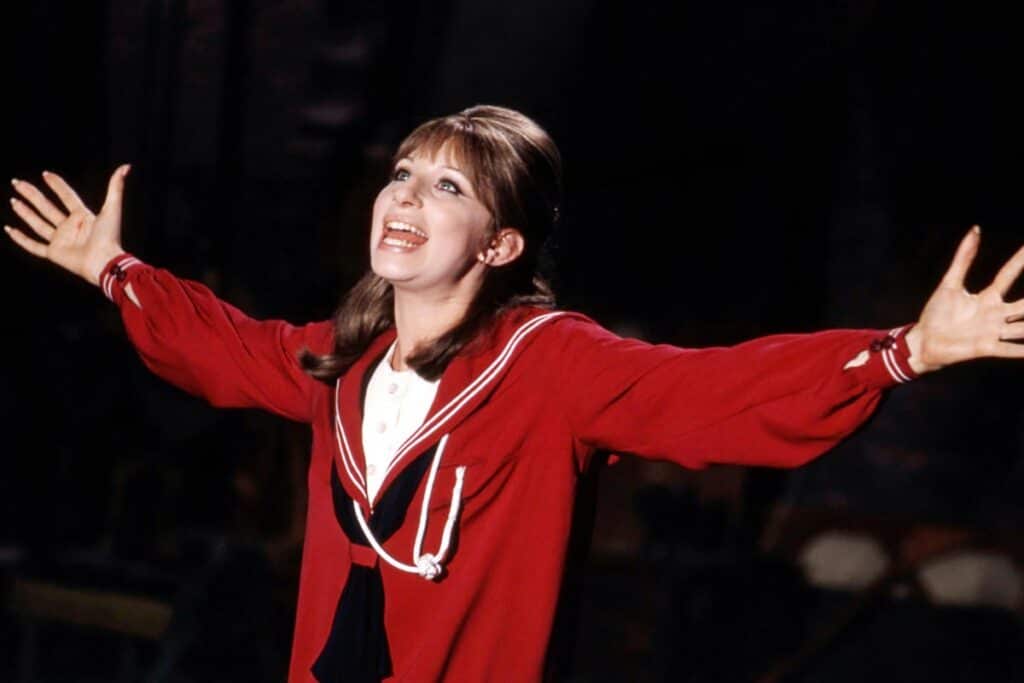
She is one of only 19 EGOT winners in history, having received an Emmy, Grammy, Oscar, and Tony award — a testament to her unparalleled talent and versatility in the entertainment industry.
Beyond her EGOT achievements, Streisand’s music career boasts numerous hit albums and singles, and she has also earned acclaim as a film director, with notable works like “Yentl” and “The Prince of Tides.”
Streisand has always embraced her Jewish identity, regularly expressing pride in her heritage. In her 2023 memoir “My Name is Barbra,” she wrote, “I’ve always been proud of my Jewish heritage. I never attempted to hide it when I became an actress. It’s essential to who I am.”
As a cultural icon, Streisand’s influence extends beyond her artistic achievements, leaving an indelible mark on the entertainment industry and popular culture.
Streisand’s Jewish identity
Although Streisand does not consider herself observant, she told Esquire Magazine in 1982 that she is “a Jewess through and through, although I’m not religious. I don’t do anything to intentionally hurt anyone. I feel like I’m a good person and that feels very Jewish to me.”
Streisand does not attend synagogue for Shabbat but celebrates Jewish holidays such as Passover and Hanukkah.
Her connection to her Jewish identity is also evident in her music, as she famously performed “Avinu Malkeinu” (Our Father, Our King), a traditional Jewish prayer sung during the High Holidays.
While her son Jason was preparing for his bar mitzvah, Streisand felt motivated to learn alongside him.
Streisand’s engagement with her faith extended to studying Torah and Talmud alongside her son, Jason, as he prepared for his bar mitzvah. Rabbi Daniel Lapin, who taught her, praised her as “one of the brightest and most sincere students I’ve ever taught. She has a natural, almost innate facility for Jewish learning.”
She faced prejudice because of her nose
From a young age, Streisand faced ridicule for her appearance, particularly her nose. In high school, she was bullied and derogatorily called “big beak.”
As she entered show business, critics and industry professionals advised her to get a nose job. One theater company owner even remarked, “She’s very talented, but God, she’s so ugly. What are we going to do with her?” Despite the pressure, the actress refused to undergo cosmetic surgery, fearing it might affect her singing voice.
In a 2019 interview with Refinery29, she reflected on the criticism: “At the beginning of my career, I kept hearing, ‘“Why don’t you fix your nose?’ I’ve never understood the nose thing. If you look at photographs, you’ll see that Jewish people can have all sorts of noses…big, small, narrow, wide. Big noses are not unique to our religion…I happen to like my nose, and I’m proud of my Jewish identity.”
Rather than hindering her career, Streisand’s choice to embrace her natural appearance and Jewish identity became a defining strength. Her authenticity allowed her to bring depth and realism to Jewish characters like Fanny Brice.
Neil Gabler, in his 2016 book “Barbra Streisand: Redefining Beauty, Femininity, and Power,” highlighted this, noting that Streisand was “the first star who succeeded because of her Jewishness and not in spite of it.” This marked a significant shift in how Jewishness was perceived in the entertainment industry.
Embracing her Jewish roots as Fanny Brice
Despite initial skepticism from Columbia Records, who deemed her “too Jewish” and “too ethnic,” Streisand found success in Jewish roles including, Miss Marmelstein in “I Can Get It for You Wholesale,” Dolly Levy in “Hello, Dolly!” and a teenage yeshiva boy in “Yentl.”
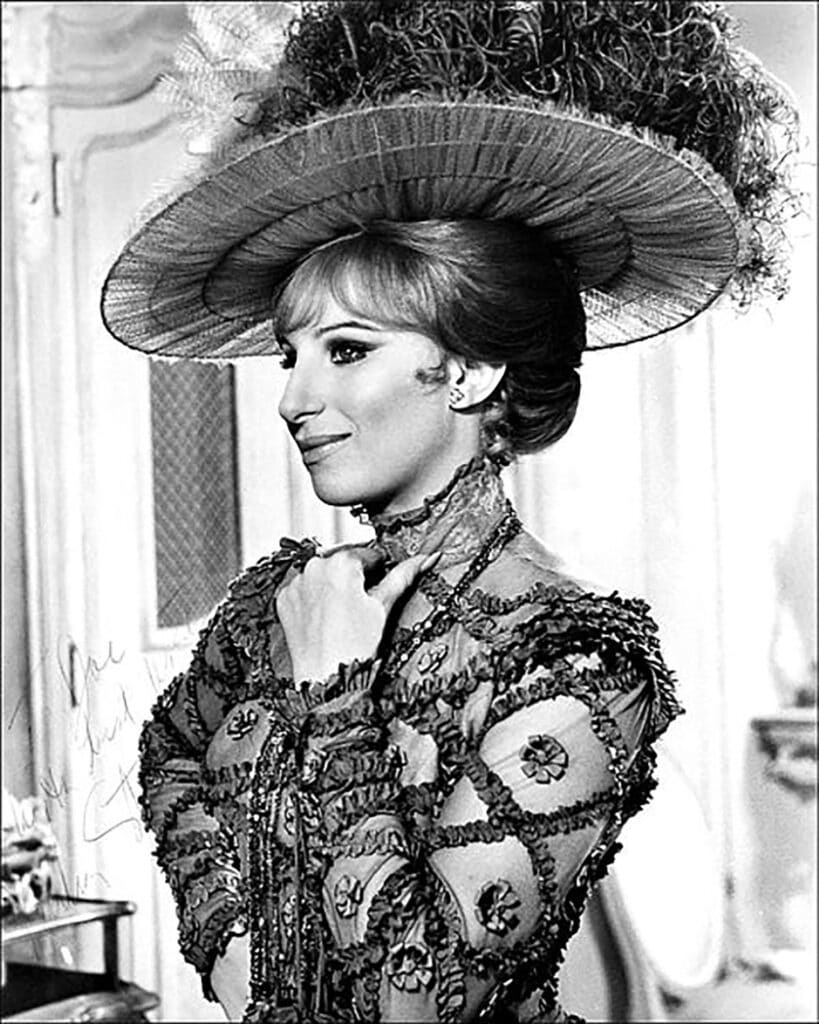
Israeli scholar Liora Moriel noted that “even when she plays a non-Jew, she is Jewish nonetheless, acting the part with courage and conviction. She even made the lead role in the classic ‘A Star Is Born’ Jewish, and insisted on playing a Jewish Rose in ‘The Mirror Has Two Faces,’ formerly a French farce.”
Streisand’s portrayal of the legendary Jewish comedian Fanny Brice in “Funny Girl” on Broadway and its 1968 film adaptation remains her most iconic role. Known for her dramatic flair and Jewish identity, Streisand was the perfect fit for the role and has become virtually synonymous with the character.
Like Streisand, Brice was born in Brooklyn and faced discrimination for her distinctive nose. Both women embraced their Jewishness, turning critiques about their looks into self-deprecating humor. Before the show’s opening night in 1964, Streisand remarked that she didn’t extensively research the character, explaining that she was hired due to her natural similarities with the role.
In 2019 she discussed her connection to Brice, stating, “I wasn’t interested in merely doing an imitation. I wanted to find my own connection to her. In some ways, we were kindred spirits, and I felt if I could be true to that, I would be true to her.” This approach to the role further solidified Streisand’s reputation as an artist who draws from her own experiences to bring depth and authenticity to her performances.
She produced and directed the Jewish film “Yentl”
Streisand took on the roles of writer, director and lead actor in the 1983 film adaptation of Isaac Bashevis Singer’s story “Yentl.” In the film, she plays a Jewish girl who disguises herself as a yeshiva boy to learn Talmud.
It took Streisand 15 years to secure funding and support for “Yentl,” as it was perceived as “too Jewish” to appeal to the masses.
In her memoir, Streisand recalls, “The studio executives refused to see beyond the Jewish context of ‘Yentl’ to the larger themes of gender equality. Their real concern was unspoken but I could feel it. They did not want to draw attention to Jews and their world. Jews were considered too different, alien, especially now, and again, and it seems always …”
Although today there is much debate about whether non-Jewish actors should portray Jewish characters, decades ago, it was challenging for Jews to even get cast in Jewish roles.
After Streisand attempted to cast Jewish actress Carol Kane as Hadass, she received more antisemitic backlash from the studio who told her three Jewish leads were too many.
“Did they expect me to vet actors according to their religion?” she recalled. “And by the way, had nobody noticed that this was, after all, a movie about Jews?” When Streisand ended up casting Amy Irving as Hadass, she hid the fact that Irving’s father was Jewish.
Although the movie received critical acclaim and was a box office hit, Streisand was notably overlooked for a Best Director nomination at the Academy Awards.
She has a long-standing relationship with Israel
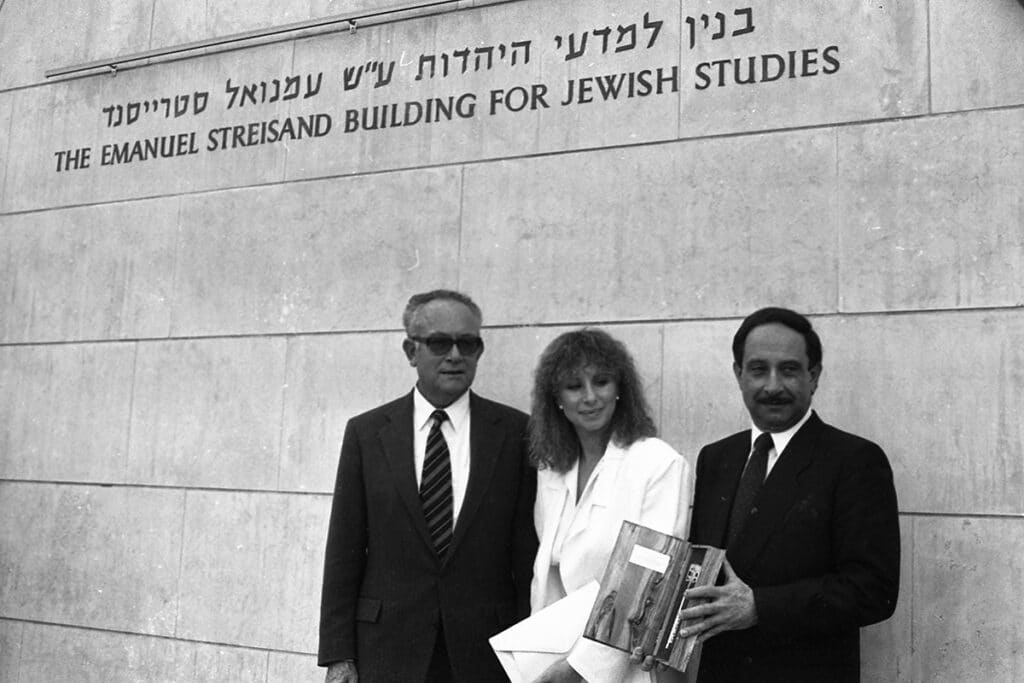
Streisand has visited Israel several times and has used her platform to celebrate the country’s achievements as well as advocate for social justice and peace. Here are some of the highlights:
- In 1978, Streisand headlined the TV special “The Stars Salute Israel at 30” for Israel’s 30th anniversary, where she performed “Hatikva” and engaged in a satellite conversation with then-Prime Minister Golda Meir.
- During the Israeli premiere of “Yentl” in 1984, Streisand dedicated the Emanuel Streisand School of Jewish Studies at Hebrew University in Jerusalem, named after her father.
- In 2011, Streisand headlined the Friends of the Israel Defense Forces (FIDF) Western Region Gala in Los Angeles, where she sang “Aveinu Malkeinu” and spoke about her love for the Jewish people and the importance of community in Judaism.
- In 2013, Streisand received an honorary doctorate from the Hebrew University of Jerusalem, recognizing her commitment to Israel and Jewish education. In her acceptance speech, she emphasized her connection to Israel and advocated for women’s rights at the Western Wall.
How did Streisand react to Oct. 7 and the Israel-Hamas War?
After Oct. 7, Streisand initially expressed her solidarity with Israel, saying on Instagram that she was “shocked and shaken” by Hamas’s attacks, which she described as “brutality without any humanity or compassion.”
However, Streisand later deleted this post, leading to speculation among her Jewish fans that she removed it to avoid affecting the publicity for her newly-released autobiography.
Although she removed the Instagram post, Streisand maintained a tweet from Oct. 9 emphasizing the scale of the tragedy in Israel.
The population of Israel is under 10 million people. There are over 700 confirmed Israeli dead from this terrorist attack on civilians. The equivalent in the US would be over 25,000 dead in New York City on 9/11.
— Barbra Streisand (@BarbraStreisand) October 9, 2023
In a November 2023 appearance on “The Late Show with Stephen Colbert,” the actress spoke about the Israel-Hamas war, expressing her wish for peace.
“It’s sad about what’s going on today. People have to live together even though they are different religions. I hope for the best because this is heartbreaking…The children, the mothers, doesn’t matter what religion they are. This is insanity for us not to learn how to live together in peace,” she said.
She is outspoken about antisemitism
Streisand’s acceptance speech at the Screen Actor’s Guild Awards ceremony is just one of the many instances when she has spoken out against antisemitism.
In 2019, Streisand expressed her alarm over the global surge in antisemitism, telling The Chicago Tribune, “As [a] person who is proud of my Jewish heritage, it’s deeply concerning. It’s undeniable that antisemitism is one of the most vexing, terrifying issues of our times.”
In her 2023 memoir, she wrote, “I think Jews are still ‘the other,’ in some ways. For centuries they’ve been used as scapegoats…blamed over and over again for the ills of the world. People are afraid of ‘the other’ and even more afraid of being identified as ‘the other.’”
Streisand is a generous philanthropist
Beyond her entertainment achievements, Barbra Streisand is an active philanthropist, motivated by the Jewish principle of tikkun olam to support both Jewish and non-Jewish causes.
“I have enough money, thank God, and the only reason I want it is to give it away,” the star shared with The New York Times in 1983. “There’s nothing more I need.”
In 1987, she founded the Barbra Streisand Foundation, a charity that supports over 2,000 nonprofit organizations including Planned Parenthood, Teach for America, and the Environmental Defense Fund. In 2008, Streisand founded the Barbra Streisand Women’s Cardiovascular Research and Education Program at Cedars-Sinai.
In her philanthropy, she has also supported Holocaust survivors, the Israel Defense Forces, and Israeli universities such as Hebrew University in Jerusalem and Tel Aviv University.
In recognition of her efforts, Streisand received the Genesis Award in 2023 for her Jewish activism. During her acceptance speech, she said, “I am very proud of my Jewish heritage and have always been moved by the Jewish tradition of tikkun olam to repair the world. I hope to join and inspire others in their own commitment to build a better world.”
Streisand’s enduring legacy
Reflecting on Streisand’s legacy, Israeli scholar Liora Moriel observed, “To her fans, Streisand is a trailblazer who has developed her own unique sense of style and beauty. Her lifework, as expressed in her music and movies, as well as in her political activism, is a defiant reexamination and redefinition of these terms — beauty, style, woman, activist — on her own terms.”
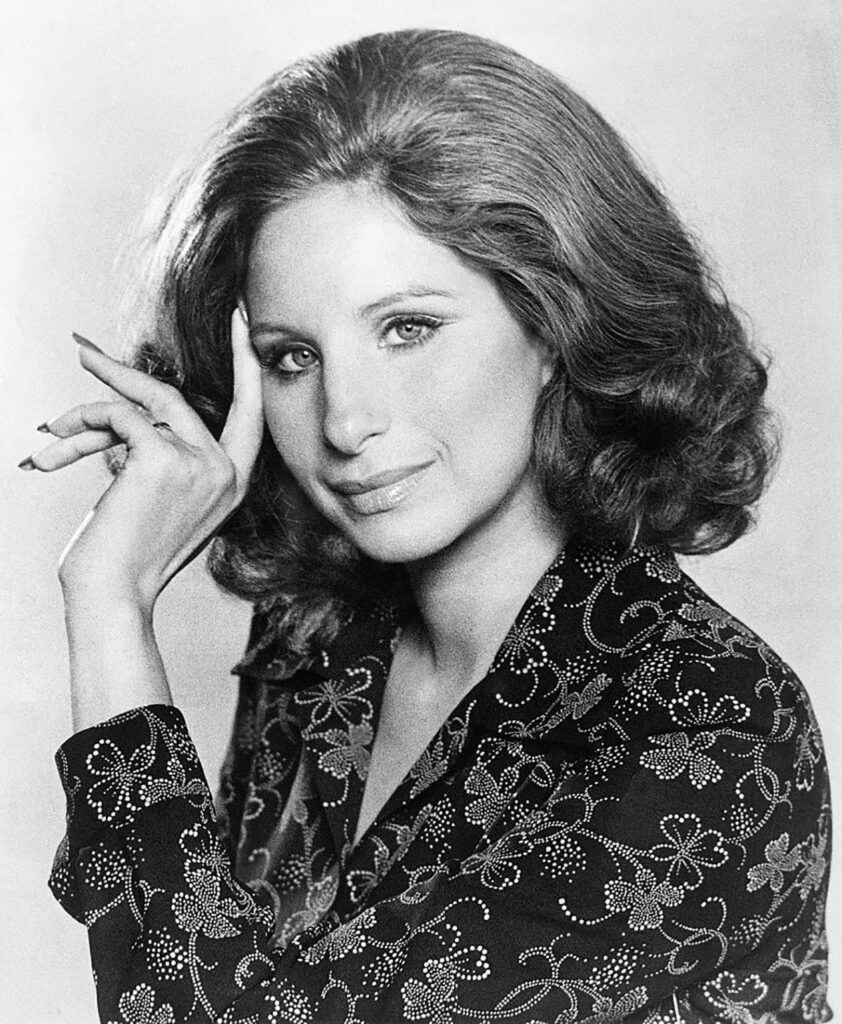
Designer Isaac Mizrahi, who regards Streisand as “one of my icons,” shared in the March 1997 issue of Out magazine: “She was kind of a misfit, and yet she convinced everyone she was beautiful, including me. She is beautiful, but she’s not the prototypical ideal of female beauty.”
For the Jewish community, specifically, Streisand’s legacy is one of authenticity and representation. “Before Streisand, conventional wisdom stated that for an actor, looking Jewish meant being relegated to supporting roles,” Moriel noted. “Now, over half a century after Streisand’s debut, looking Jewish, ethnic or in any way different has become chic. Streisand’s Jewishness is not a role, but a lifestyle.”
Originally Published Feb 28, 2024 10:32AM EST
